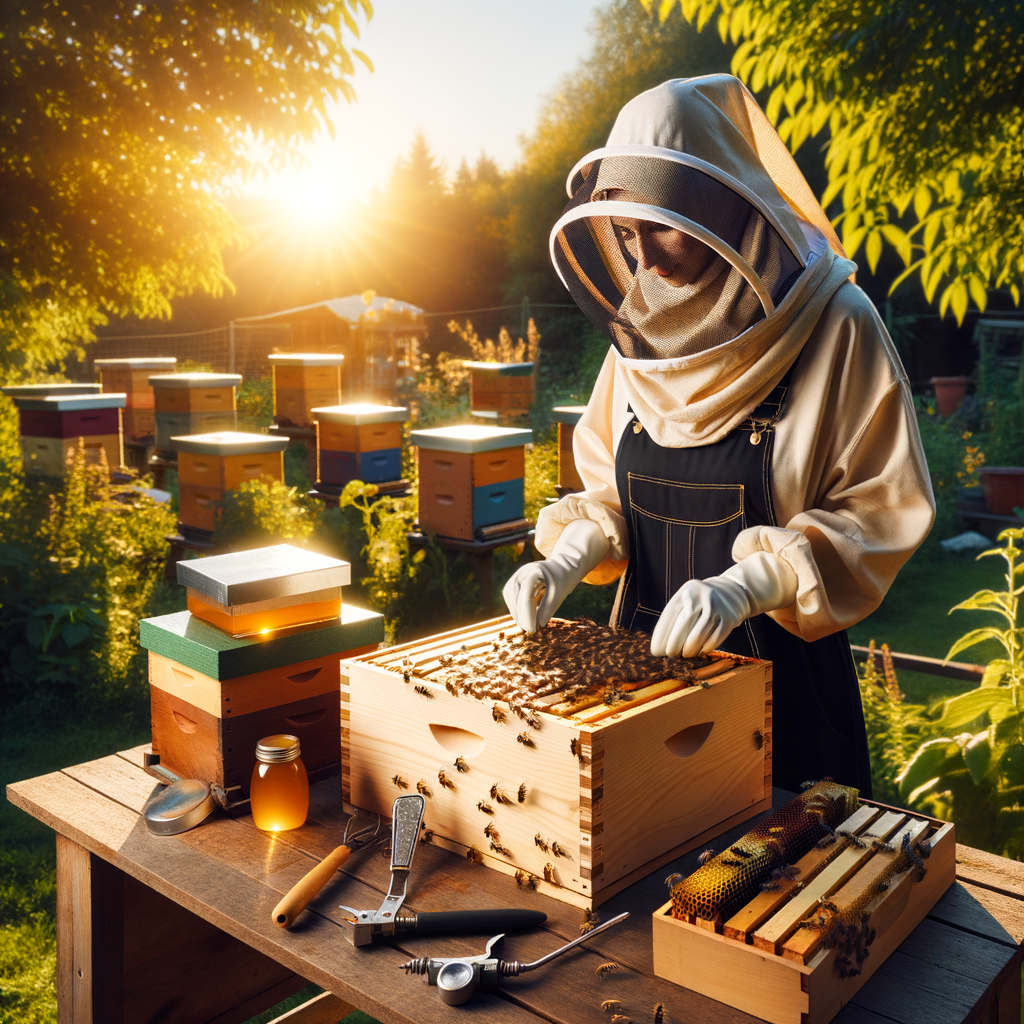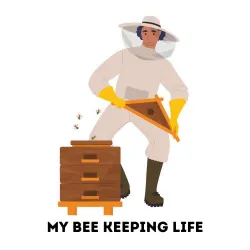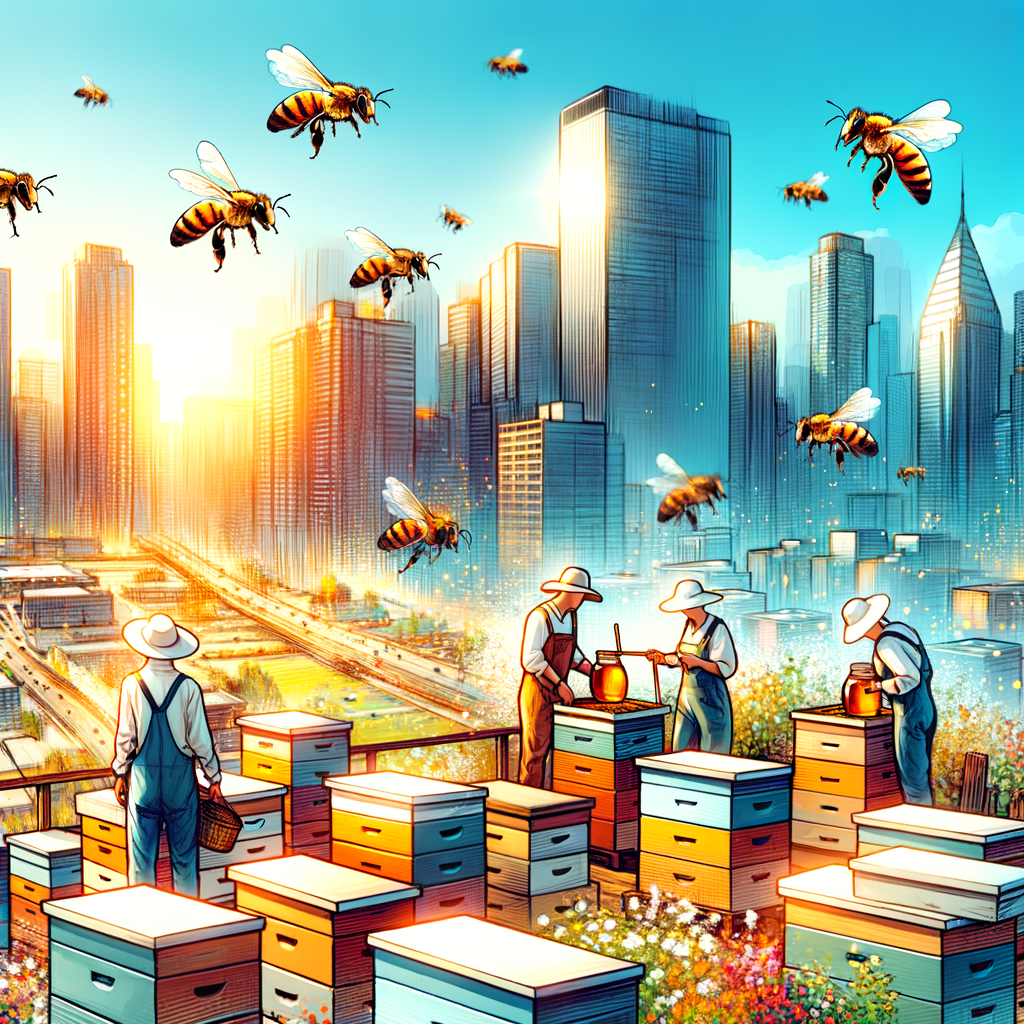
Introduction to Beekeeping
Welcome to the fascinating world of beekeeping! This practice, which involves the maintenance of bee colonies in man-made hives, has been around for thousands of years. Whether you’re interested in beekeeping as a hobby or as a potential business, understanding the basics and its importance is key to success.
- Understanding the basics of beekeeping
- Why beekeeping is an important practice
Beekeeping, also known as apiculture, is the practice of maintaining bee colonies, usually in hives. The bees are kept for their honey and other products like beeswax, propolis, and royal jelly. But, it’s not just about collecting honey. Beekeepers also play a crucial role in helping the bees to pollinate flowers, which is vital for our ecosystem.
As a beekeeper, you will need to learn about the different types of bees, their behaviors, and their needs. You will also need to understand how to handle bees safely and how to maintain their hives. It’s a practice that requires patience, care, and a love for nature.
Beekeeping is not just about honey production. It plays a significant role in supporting our environment. Bees are excellent pollinators, which means they help plants to reproduce. Without bees, many of our favorite fruits and vegetables would become much less common and more expensive.
Moreover, beekeeping can be a rewarding and profitable hobby or business. The products from a hive, such as honey, beeswax, and royal jelly, are in high demand. Plus, the practice of beekeeping can be therapeutic and fulfilling, connecting us with nature in a unique way.
In the following sections, we will delve deeper into the world of beekeeping, providing you with essential knowledge, tips, and guides to help you get started on your beekeeping journey. So, let’s buzz into it!
Beekeeping for Beginners: Getting Started
Starting your journey into beekeeping can be exciting and rewarding. However, it’s essential to know the right steps to take and common mistakes to avoid. This will ensure your success and protect the well-being of your bees.
- Steps to Starting Beekeeping
- Education: Learn as much as you can about beekeeping. Read books, watch videos, and consider taking a beekeeping class.
- Choose the Right Location: Bees need a suitable environment to thrive. Your hive should be in a place with plenty of sunlight, flowers for nectar, and a nearby water source.
- Get Your Beekeeping Equipment: Essential beekeeping tools include a beehive, bee suit, smoker, and hive tool.
- Buy Your Bees: You can purchase bees from a local beekeeper or online. Make sure you buy from a reputable source to ensure the health of your bees.
- Inspect Your Hive Regularly: Regular inspections will help you spot any problems early and keep your hive healthy.
- Common Mistakes to Avoid When Starting Beekeeping
- Not Learning Enough: Beekeeping requires knowledge and skills. Make sure you learn enough before you start.
- Ignoring Local Laws: Some areas have regulations about beekeeping. Always check your local laws before setting up your hive.
- Not Having the Right Equipment: Beekeeping requires specific tools. Trying to manage without them can harm your bees and make your job harder.
- Not Inspecting the Hive Regularly: Regular inspections are crucial for spotting problems early. If you neglect this, your hive could become sick.
- Not Preparing for Winter: Bees need extra care in winter. If you don’t prepare your hive for the cold, your bees may not survive.
Here are some simple steps to guide you as you embark on your beekeeping journey:
As a beginner, it’s easy to make mistakes. Here are some common ones to avoid:
Remember, beekeeping is a journey of learning and discovery. Don’t be discouraged by mistakes. Instead, learn from them and keep improving. Happy beekeeping!
Best Time for Beekeeping: Understanding the Beekeeping Season
Understanding the beekeeping season is crucial for anyone interested in this fascinating hobby or business. The timing of your beekeeping activities can significantly impact the health and productivity of your bees. Let’s delve into the best times for beekeeping and how the season affects this practice.
- When to start beekeeping
- How the season affects beekeeping
Starting beekeeping at the right time is essential. The best time to start beekeeping is in the spring. This is when bees begin to emerge from their hives and start collecting nectar and pollen from blossoming flowers. By starting in spring, you give your bees ample time to build a strong colony before the winter months. It’s also the season when bees are most productive, making it an excellent time for beginners to learn the ropes.
The season significantly affects beekeeping. During spring, bees are active and productive, collecting nectar and pollen to feed their colony. This is the best time for honey production. However, as summer approaches, the nectar flow decreases, and bees may become more defensive. Beekeepers need to ensure their bees have enough food during this time.
In the fall, bees prepare for winter by gathering food and sealing their hive. Beekeepers should avoid disturbing the bees during this time. Winter is a quiet season for beekeeping. The bees cluster together to stay warm, and the beekeeper’s main job is to ensure the hive is well-insulated and has enough food to last until spring.
In conclusion, understanding the beekeeping season is crucial for successful beekeeping. By knowing when to start and how to adapt to each season, you can ensure your bees are healthy, productive, and well-cared for throughout the year.
| Season | Bee Activity | Beekeeper’s Role |
|---|---|---|
| Spring | Bees are active and productive, collecting nectar and pollen. | Start beekeeping, monitor hive health, and harvest honey. |
| Summer | Bees may become more defensive as nectar flow decreases. | Ensure bees have enough food, monitor for pests and diseases. |
| Fall | Bees prepare for winter by gathering food and sealing the hive. | Avoid disturbing the bees, prepare the hive for winter. |
| Winter | Bees cluster together to stay warm. | Ensure the hive is well-insulated and has enough food. |
Beekeeping Guide: Essential Knowledge
One of the most important aspects of successful beekeeping is understanding bee behavior. This includes how bees communicate and their lifecycle. Let’s delve into these topics to gain a better understanding of our buzzing friends.
Understanding Bee Behavior
Bees are fascinating creatures with complex behaviors. To effectively manage a bee colony, it’s crucial to understand these behaviors. Let’s explore two key aspects: how bees communicate and their lifecycle.
- How bees communicate
- Understanding the bee lifecycle
Bees communicate through a series of movements known as the “waggle dance”. This dance is a way for bees to tell their hive mates where to find food and other resources. The direction and duration of the dance provide specific information about the distance and direction of the resource.
The lifecycle of a bee is divided into four stages: egg, larva, pupa, and adult. The queen bee lays the eggs, which hatch into larvae after about three days. The larvae are then fed by worker bees until they become pupae. After a period of development within a sealed cell, the pupae emerge as adult bees. The entire process, from egg to adult, takes about 21 days for worker bees.
Understanding these behaviors is key to successful beekeeping. By knowing how bees communicate, you can observe their dances to gain insight into where they are finding food. And by understanding their lifecycle, you can better manage your hive and ensure a healthy, thriving colony.
Beekeeping Laws and Regulations
As a beekeeper, it’s crucial to understand and abide by the laws and regulations surrounding beekeeping. These rules vary from place to place, but they are designed to ensure the safety and well-being of both the bees and the people around them. Let’s delve into the details.
- Local laws regarding beekeeping
- Importance of understanding beekeeping laws
Local laws about beekeeping can vary significantly depending on where you live. Some areas might require you to register as a beekeeper, while others may have specific rules about where you can place your hives. For example, certain cities may require hives to be a certain distance from property lines or public spaces. Some areas might even have restrictions on the number of hives you can have. It’s essential to research and understand the specific laws in your area before you start beekeeping.
Understanding the laws and regulations about beekeeping is not just a matter of legal compliance. It’s also about being a responsible member of your community and a steward of the environment. Bees play a crucial role in our ecosystem, and proper beekeeping practices help ensure their survival. Additionally, following the laws can help you avoid conflicts with neighbors and other members of your community. Remember, ignorance of the law is not an excuse, and failure to comply can result in fines or other penalties.
In conclusion, beekeeping is a rewarding hobby or business, but it comes with responsibilities. Before you start, make sure you understand and are prepared to follow the local laws and regulations. This will not only protect you legally, but it will also help you contribute positively to your community and the environment.
| Key Points |
|---|
| Understand local beekeeping laws before starting |
| Compliance with laws is crucial for the environment and community |
| Failure to comply can result in penalties |
Beekeeping Tips: Ensuring Success
As a beekeeper, your success hinges on your ability to handle bees safely and keep them healthy. Here are some tips that can help you achieve that.
-
How to Handle Bees Safely
Handling bees safely is paramount to successful beekeeping. Bees are delicate creatures, and mishandling can lead to their stress or even death. Here are some tips:
- Wear Protective Gear: Always wear your bee suit, gloves, and veil when handling bees. This will protect you from stings and help you feel more confident.
- Move Slowly: Quick movements can startle bees and make them defensive. When you need to handle your bees, do so with slow, gentle movements.
- Use a Bee Smoker: A bee smoker can help calm your bees and make them less likely to sting. Use it sparingly and only when necessary.
-
Keeping Your Bees Healthy
Healthy bees are productive bees. Here are some tips to ensure your bees stay in top condition:
- Provide Adequate Food and Water: Bees need a constant supply of food and water. Ensure they have access to flowering plants or provide them with a sugar syrup solution during times of scarcity.
- Monitor for Diseases and Pests: Regularly inspect your hives for signs of disease or pests. Early detection and treatment can save your colony.
- Provide a Suitable Environment: Bees need a dry, well-ventilated hive that’s protected from harsh weather. Ensure your hive location meets these criteria.
By following these tips, you can ensure your bees are safe, healthy, and productive. Remember, successful beekeeping requires patience, diligence, and a willingness to learn. Happy beekeeping!
Beekeeping Equipment: Tools of the Trade
Whether you’re a beginner or an experienced beekeeper, having the right equipment is crucial for success. Let’s explore the essential tools of the trade and why investing in quality beekeeping equipment is a wise decision.
- Essential beekeeping equipment for beginners
As a beginner, you don’t need to buy all the beekeeping equipment at once. However, there are some essential tools you should have to start your beekeeping journey.
| Equipment | Description |
|---|---|
| Beehive | This is the home for your bees. It’s where they will produce honey and raise their young. |
| Bee suit and gloves | These will protect you from bee stings while you’re working with the hive. |
| Smoker | A smoker calms the bees, making it safer for you to inspect the hive. |
| Hive tool | This is a multipurpose tool used for opening the hive, separating frames, and scraping off excess wax and propolis. |
- Investing in quality beekeeping equipment
Quality beekeeping equipment may cost a bit more, but it’s a worthwhile investment. High-quality equipment lasts longer, performs better, and can make beekeeping tasks easier and more enjoyable.
For instance, a well-made beehive can withstand harsh weather conditions and provide a comfortable home for your bees for many years. A good-quality smoker will produce the right amount of smoke to calm your bees without harming them.
Remember, beekeeping is not just about producing honey. It’s about creating a sustainable environment for your bees. And that starts with investing in quality equipment.
Beekeeping Benefits: More than Just Honey
While many people associate beekeeping with the production of honey, the benefits of this practice extend far beyond this sweet treat. Beekeeping plays a crucial role in our environment and can also have significant health benefits. Let’s delve into these benefits in more detail.
- Environmental benefits of beekeeping
Beekeeping has a profound impact on our environment. Bees are known as nature’s most efficient pollinators. They help in the pollination of over 70% of the world’s crops, contributing to biodiversity and food security. Without bees, many of our favorite fruits, vegetables, and nuts would become scarce and expensive.
Moreover, beekeeping encourages the preservation of green spaces. Bees need a diverse range of plants to survive, which promotes the growth and maintenance of gardens and wildflowers. This not only beautifies our surroundings but also aids in carbon sequestration, helping to combat climate change.
- Health benefits of beekeeping
Beekeeping isn’t just good for the environment; it’s also beneficial for our health. The honey produced by bees is a natural sweetener packed with antioxidants, which can boost your immune system and aid in digestion. It also has antibacterial properties and can be used to soothe sore throats and coughs.
Beekeeping can also be a therapeutic activity. The process of caring for bees and harvesting honey requires patience and focus, which can help reduce stress and improve mental wellbeing. Plus, the physical activity involved in beekeeping can contribute to overall fitness.
In conclusion, beekeeping offers a host of benefits beyond honey production. It’s a practice that supports our environment, contributes to our health, and even offers therapeutic benefits. So, the next time you enjoy a spoonful of honey, remember the hardworking bees and the beekeepers who made it possible.
Beekeeping Startup Guide: From Hobby to Business
Are you a beekeeping enthusiast looking to turn your hobby into a profitable business? If so, you’re in the right place. In this section, we will guide you through the steps of turning your beekeeping hobby into a business and marketing your beekeeping products effectively.
-
Turning your beekeeping hobby into a business
- Business Plan: Outline your business goals, target market, and strategies for reaching your target market.
- Legal Requirements: Research and comply with local and national regulations for beekeeping and honey production.
- Investment: Determine the initial investment needed for equipment, bees, and other startup costs.
- Production: Plan your production process, including harvesting, processing, and packaging.
-
Marketing your beekeeping products
- Identify Your Target Market: Understand who your customers are and what they want.
- Brand Your Products: Create a unique brand that reflects the quality and benefits of your products.
- Online Presence: Use social media and a business website to reach a wider audience.
- Participate in Local Events: Join farmers’ markets, fairs, and other local events to showcase your products.
Starting a beekeeping business requires careful planning and a deep understanding of the industry. Here are some steps to help you get started:
Remember, success doesn’t come overnight. It requires patience, hard work, and a love for bees.
Marketing is crucial for the success of your beekeeping business. Here are some tips to help you market your products effectively:
Remember, effective marketing is about building relationships with your customers and providing them with quality products they can trust.
Turning your beekeeping hobby into a business can be a rewarding journey. With the right planning and marketing strategies, you can create a successful beekeeping business and contribute to the health of our planet’s ecosystems.
Beekeeping Essentials: Key Takeaways
As we reach the end of our comprehensive guide on beekeeping, it’s important to revisit the essential knowledge we’ve gathered and consider the next steps in your beekeeping journey. Let’s summarize the key points and look forward to what’s next.
- Recap of essential beekeeping knowledge
Understanding the basics of beekeeping is crucial for success. Here’s a quick recap of the essential knowledge we’ve covered:
| Topic | Key Points |
|---|---|
| Introduction to Beekeeping | Beekeeping is a rewarding hobby that requires commitment and knowledge about bees and their behavior. |
| Best Time for Beekeeping | The beekeeping season varies, but spring and summer are generally the best times to start. |
| Essential Beekeeping Knowledge | Understanding bee behavior, hive management, and disease control are crucial for successful beekeeping. |
| Beekeeping Equipment | Essential tools include a bee suit, smoker, hive tool, and bee brush. |
| Beekeeping Benefits | Beyond honey production, beekeeping benefits include pollination, wax production, and the joy of nurturing a hive. |
- Next steps in your beekeeping journey
Now that you’ve gained a solid foundation in beekeeping, it’s time to consider the next steps. Here are some suggestions:
- Continue Learning: Beekeeping is a lifelong learning process. Keep reading, attending workshops, and connecting with other beekeepers.
- Start Small: Begin with one or two hives, and as you gain confidence and experience, gradually expand your apiary.
- Join a Local Beekeeping Association: This can provide support, mentorship, and valuable resources.
- Consider Turning Your Hobby into a Business: Once you’re comfortable with beekeeping, you might consider selling your honey and other bee products.
In conclusion, beekeeping is a rewarding and fascinating hobby. With the right knowledge and tools, you can enjoy the sweet rewards of your hard work. Remember, every beekeeper started where you are now. With patience and persistence, you’ll become a confident beekeeper in no time.








